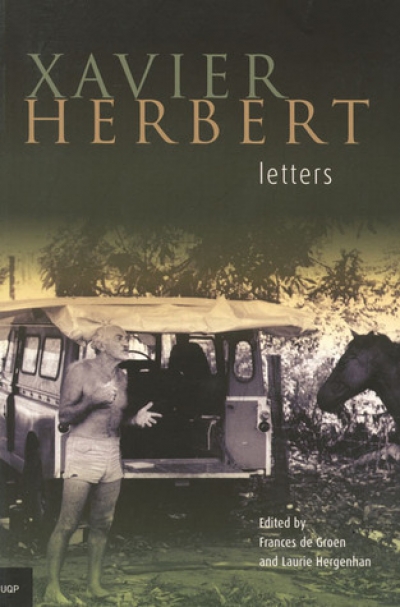Laurie Hergenhan
I visited Randolph Stow on impulse. We had corresponded briefly and since I was passing through London in February 1975, I asked if I might meet him. He kindly invited me to spend the day with him in East Bergholt, a village in Suffolk, two hours from London. Stow had been living there, in Dairy Farm Cottage, for some six years. Six years later, he moved to nearby Harwich.
... (read more)Cyril Hopkins’ Marcus Clarke edited by Laurie Hergenhan, Ken Stewart and Michael Wilding
Oxford traveller
Dear Editor,
In his ‘Diary’ in the March 2007 issue of ABR, Chris Wallace-Crabbe tells us that he’s been reading Ulysses and War and Peace (‘alternately’) as he travels to Oxford. Then, out of the blue, he adds: ‘Meanwhile, Ken Gelder has written the most appalling attack on literature, and especially on the concept of style, in the latest Overland. His anti-aesthetic position is, of course, indistinguishable from that of John Howard and the right-wing philistines. It has been so for a long time: the right and the far-left in materialist cahoots.’ My Overland essay was a criticism of Tory literary tastes and positions in Australia, including the disdain some writers have for readerships. Only a blinkered literary snob could construe this as an ‘attack on literature’. I found Wallace-Crabbe’s insulting remarks utterly perplexing. For example, what does he mean by ‘the concept of style’? Whose concept? I have no idea. What does he mean by ‘anti-aesthetic’? The term used to be used by postmodernists, but he also attributes it to John Howard – a point which seems to fly in the face of reality.
... (read more)Turkish Novelist Orhan Pamuk, aged fifty-four and native of Istanbul, where he has lived nearly all his life, has won the Nobel Prize for Literature. While his initial popularity in Turkey has declined because of the increasing complexity of his work, since the 1990s Pamuk has won increasing international acclaim as his works have been widely translated (Faber is his English publisher). Five novels have been translated: The White Castle (1990), winner of the Independent Award for Foreign Fiction; The Black Book (1994); The New Life (1997), a bestseller in Turkey; My Name Is Red (2001), winner of the IMPAC Dublin Award (2003); and Snow (2004).
... (read more)The Difficulties of My Position: The diaries of prison governor John Buckley Castieau 1855–1884 by Mark Finnane
The puzzle of PhDs
Dear Editor,
It’s pretty clear that historians can’t win, especially if they have the audacity to use a doctoral thesis as the basis for a book. As I read Aviva Tuffield’s puzzling review (ABR, December 2003/January 2004) of Clare Wright’s Beyond the Ladies Lounge, and Wright’s understandably puzzled response (ABR, February 2004), I was reminded of a debate that occurred over several issues of ABR in 2002, which spawned plenty of silly generalisations about the quality of writing in PhD theses, but not much else.
... (read more)Xavier Herbert: Letters edited by Frances de Groen and Laurie Hergenhan
Xavier Herbert: Letters edited by Frances de Groen and Laurie Hergenhan
Paul Kane reviews ‘The Poetry of Les Murray’ edited by Laurie Hergenhan and Bruce Clunies Ross, ‘Les Murray’ by Steven Matthews, and ‘Poems the Size of Photographs’ by Les Murray
You might expect a book of eighty-eight new poems by Les Murray to be sizeable (most of his recent single volumes run to about sixty poems each). But Poems the Size of Photographs is literally a small book, composed of short poems (‘though some are longer’, says the back cover) ...
... (read more)Bauman’s point of departure
Dear Editor,
Boris Frankel bursts in through open doors. He gives Zygmunt Bauman and me stick for speaking our truths (ABR, October 2001). Viewed in its own terms, what remains of the Left in Australia is in a bad way because it has failed (1) to clarify its ethics, norms and values and (2) to develop alternative visions and policies upon them; because (3) there is no popular bearer or social movement available to carry these invisible ends; and (4) because there is no evidence of popular support for a new society, present unhappiness and misery notwithstanding. If this is not modern, what is it? (If the Soviet and Nazi experiences were not modern, what were they?)
... (read more)



